外研版(2019) 必修 第三册 Unit 5 What an adventure! Grammar课件(共38张PPT)
文档属性
| 名称 | 外研版(2019) 必修 第三册 Unit 5 What an adventure! Grammar课件(共38张PPT) |  | |
| 格式 | zip | ||
| 文件大小 | 7.9MB | ||
| 资源类型 | 教案 | ||
| 版本资源 | 外研版(2019) | ||
| 科目 | 英语 | ||
| 更新时间 | 2023-03-12 11:58:26 | ||
图片预览

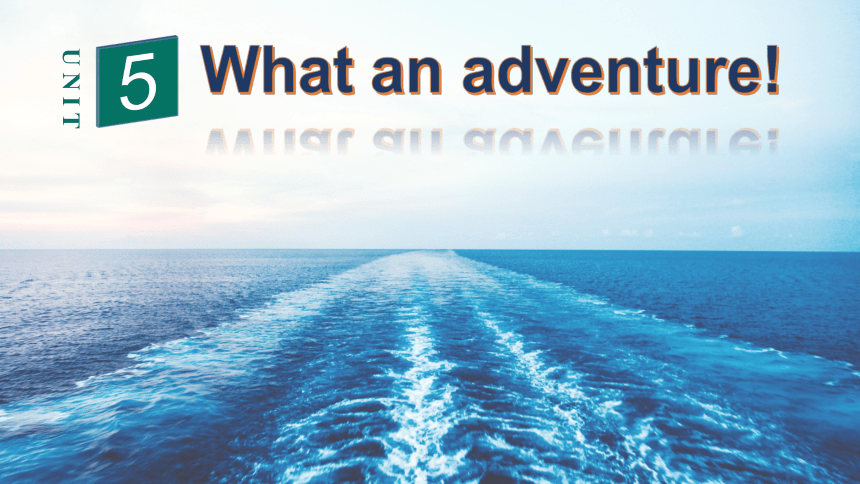
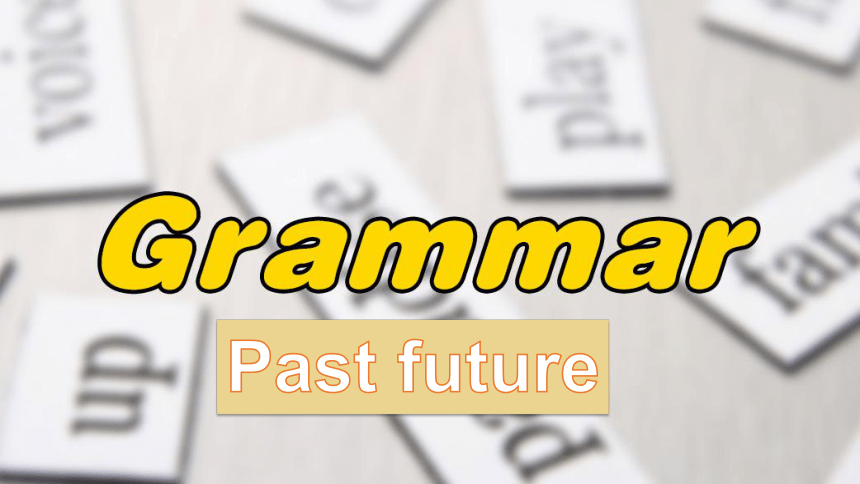
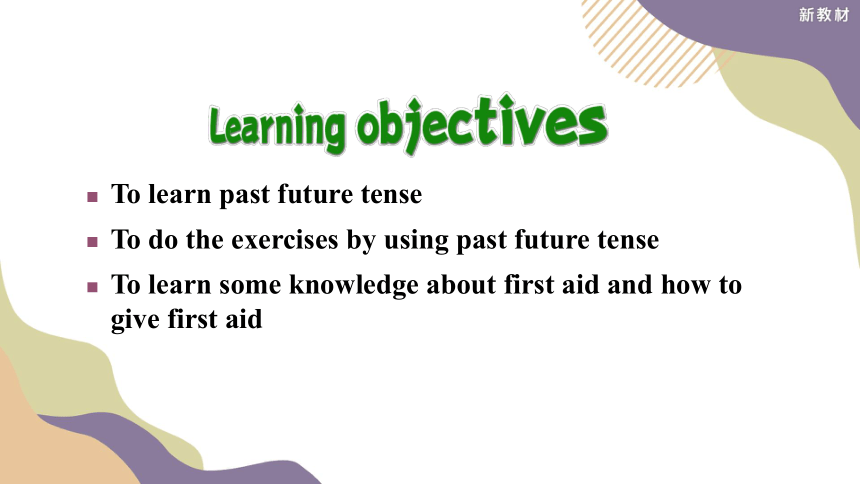

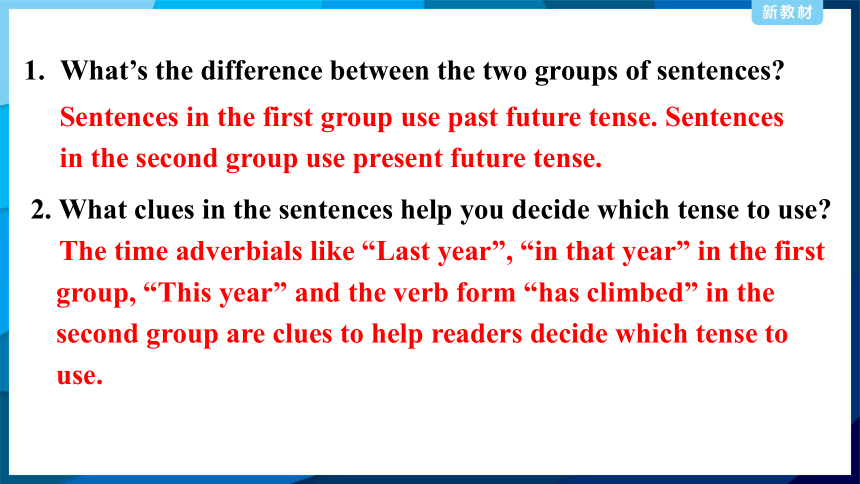
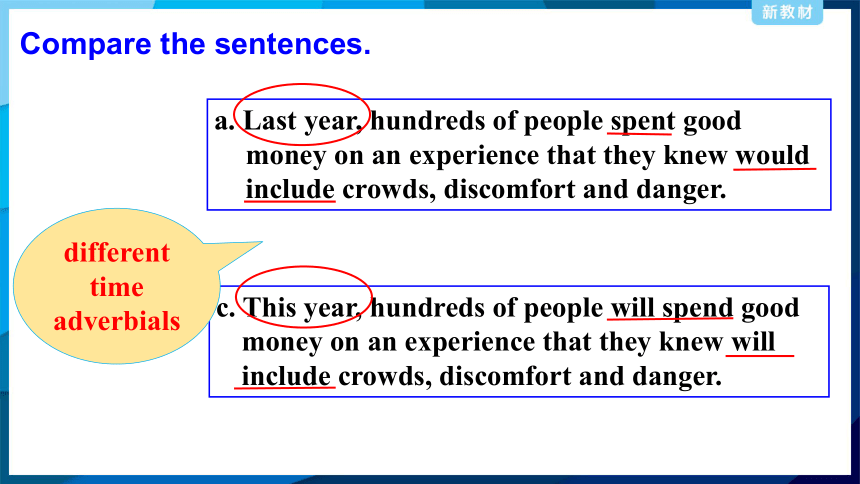
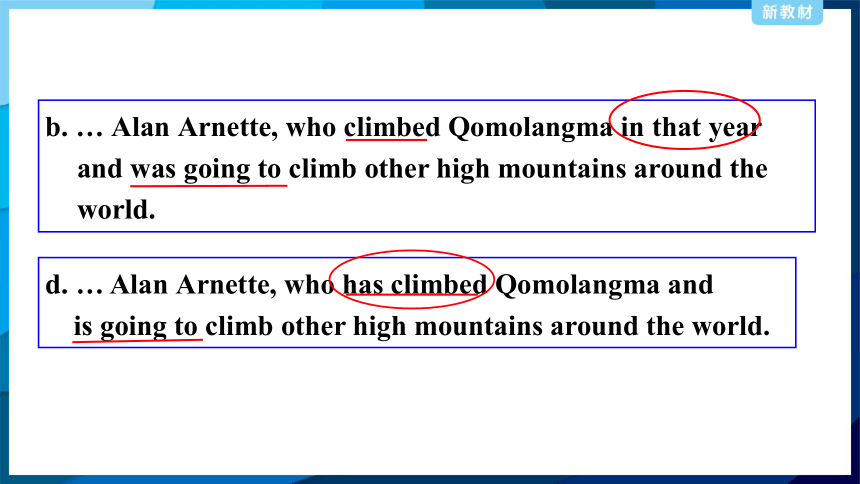
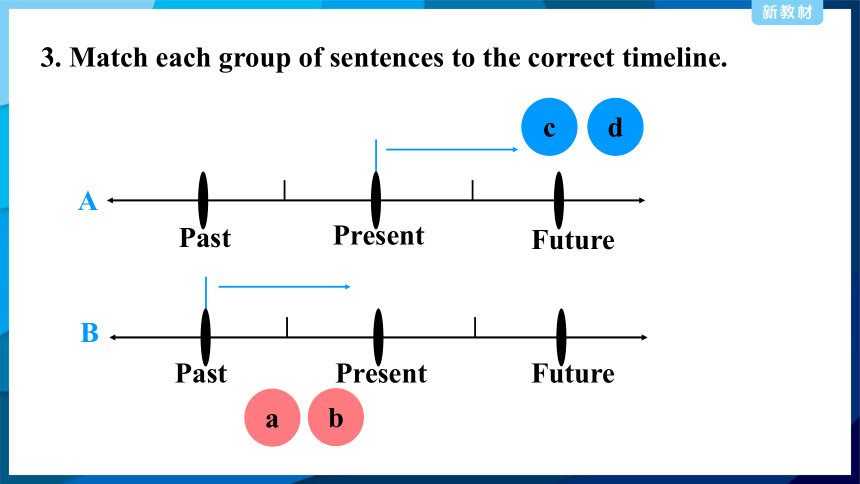
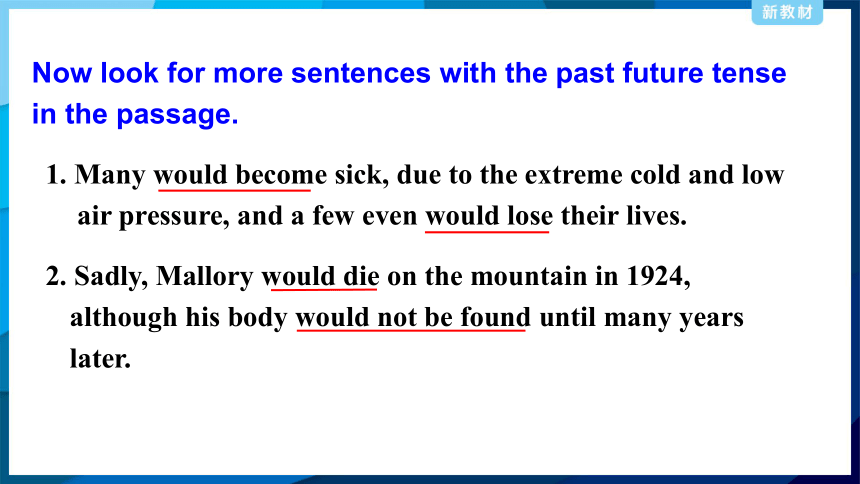
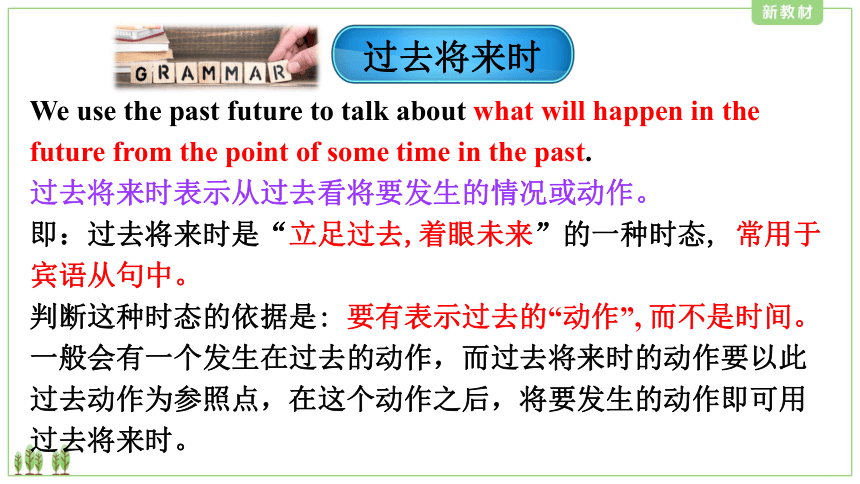
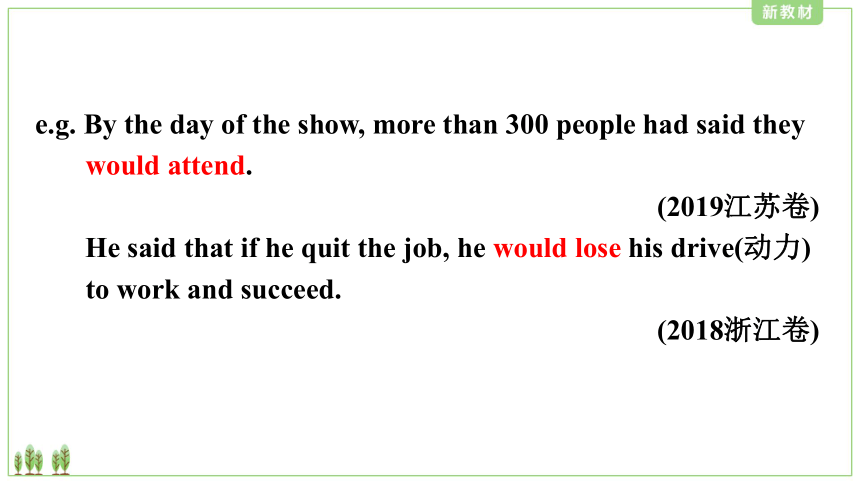
文档简介
(共38张PPT)
Unit 5
What an adventure!
5
U N I T
Past future
To learn past future tense
To do the exercises by using past future tense
To learn some knowledge about first aid and how to give first aid
Compare the two groups of sentences and answer the questions. Sentences (a) and (b) are from the reading passage.
a Last year, hundreds of people spent good money on an experience that they knew would include crowds, discomfort and danger.
b … Alan Arnette, who climbed Qomolangma in that year and was going to climb other high mountains around the world.
c This year, hundreds of people will spend good money on an experience that they knew will include crowds, discomfort and danger.
d … Alan Arnette, who has climbed Qomolangma and is going to climb other high mountains around the world.
What’s the difference between the two groups of sentences
Sentences in the first group use past future tense. Sentences in the second group use present future tense.
2. What clues in the sentences help you decide which tense to use
The time adverbials like “Last year”, “in that year” in the first group, “This year” and the verb form “has climbed” in the second group are clues to help readers decide which tense to use.
c. This year, hundreds of people will spend good money on an experience that they knew will include crowds, discomfort and danger.
a. Last year, hundreds of people spent good money on an experience that they knew would include crowds, discomfort and danger.
Compare the sentences.
different
time
adverbials
b. … Alan Arnette, who climbed Qomolangma in that year and was going to climb other high mountains around the world.
d. … Alan Arnette, who has climbed Qomolangma and
is going to climb other high mountains around the world.
A
Past
Present
Future
B
Present
Future
Past
c
d
a
b
3. Match each group of sentences to the correct timeline.
Now look for more sentences with the past future tense in the passage.
1. Many would become sick, due to the extreme cold and low air pressure, and a few even would lose their lives.
2. Sadly, Mallory would die on the mountain in 1924, although his body would not be found until many years later.
We use the past future to talk about what will happen in the future from the point of some time in the past.
过去将来时表示从过去看将要发生的情况或动作。
即:过去将来时是“立足过去,着眼未来”的一种时态, 常用于宾语从句中。
判断这种时态的依据是: 要有表示过去的“动作”, 而不是时间。
一般会有一个发生在过去的动作,而过去将来时的动作要以此过去动作为参照点,在这个动作之后,将要发生的动作即可用过去将来时。
过去将来时
e.g. By the day of the show, more than 300 people had said they would attend.
(2019江苏卷)
He said that if he quit the job, he would lose his drive(动力) to work and succeed.
(2018浙江卷)
基本构成
1. would + 动词原形
(表示从过去某个时间点看将要发生的动作或存在的状态)
He asked me if I would stay here.
(或表示过去的某种习惯性行为)
She would sit for hours doing nothing.
过去将来时
2. was/were going to +动词原形 (used to plan or make predictions about the future)
(表示过去准备或计划做某事,或者过去将要发生某事)
He said he was going to live in the countryside when he retired.
3. was/were about to do (used to refer to arranged actions that happen in the immediate future, often used with “just”)
(表示过去即将发生的事)
I was just about to go to bed when I heard a knock on the door.
I saw the soup was about to boil over, so I turned the gas off.
4. was/were to do (used to express official arrangements, official orders, or things that should be done)
(表示过去的计划安排或注定要发生的事情)
I was to see him tomorrow, but the appointment was cancelled.
We were to do whatever they told us to do.
过去将来时
一般过去将来时
过去将来进行时
过去将来完成时
(强调正在进行的动作或呈现的状态)
(强调已经完成的动作或呈现的状态)
I thought I would take a trip in Africa someday.
我想我有朝一日会去非洲旅行。
I thought I would be taking a trip in Africa during the next June. 我想我来年的6月会在非洲旅行。
I thought I would have left Africa by July.
我想我7月已经离开非洲了。
a. which / for three full days / the storm / would last
the storm which would last for three full days
b. remain / where / we would / for many months to come
where we would remain for many months to come
Write the clauses in the right order.
c. wouldn’t / for a very long time / be back / we
we wouldn’t be back for a very long time
d. from port / we / sailing / were
we were sailing from port
It was spring, and ____. We were excited -- none of us knew that these would be our final days together. At first, the sea was calm and we spent our days working, fishing and playing cards, happily unaware that ____. At that point, ____ was just a few dark clouds on the horizon. Hours later, the waves rose up over our ship, breaking it into two and throwing us overboard. Our only hope of survival was to swim to the nearest island, ____.
a
b
c
d
Now complete the captain’s memoir with the clauses.
a. the storm which would last for three full days
b. where we would remain for many months to come
c. we wouldn’t be back for a very long time
d. we were sailing from port
Complete the following sentences that describe the future in the plete the following sentences that describe the future using either form of the given verbs.
1. Philip bought two tickets for The Phadom of the Opera. He ______________________________ (watch) this musical with his girlfriend on the weekend.
2. I was so surprised at the news that David ________________ _________________ (play) the role of the dinosaur in the play that I gave him a hug out of joy.
would watch / was going to watch
would play /
was going to play
3. Lily decided that she ______________________________ (settle) in New York and pursue her dream of becoming an actress.
4. Hey, Timmy. I _______________ (call) you. But now that you are here, I don't have to.
5. The competition was so close that no one was sure who ___________ (win) the Best Actor award.
6. Jim is not here right now. He said he ______________________ (be) on duty at the library this afternoon.
would settle / was going to settle
was going to call
would win
would be / was going to be
1. Paul: I (a) __________ (visited/was about to visit) the museum with my friends last weekend. What about you
Emily: I (b) ________________ (saw/was going to see) a documentary film about the Spring Festival with Joanna on Saturday, but she didn't feel well. So I just stayed at home.
visited
was going to see
Complete the conversations with the correct expressions in the brackets.
2. Alex: We (a) __________________ (are going to hand in/ were going to hand in) our report on festivals around the world next Monday.
Colin: Yes, but I (b) _______________ (wasn’t to start/ haven't started) it yet.
Alex: You told me you (c) ________________ (would work on/worked on) it all day yesterday.
Colin: Oh, I (d) ________________ (was about to start/ would start) when my cousin (e) _______ (would come/came) over.
are going to hand in
haven't started
would work on
was about to start
came
单句语法填空
He turned to the forest department for help but was told that nothing _______________ (grow) there. (2020新高考全国I卷)
The class experiment that day was to show how heating a container of water ______________ (bring) air bubbling (冒泡) to the surface. (2020江苏卷)
When she had time, she _______________ (bring) food and medicine to them. (2020新高考全国I卷)
would bring
would bring
would grow
4. When twelve-year-old John Wilson walked into his chemistry class on a rainy day in 1931, he had no way of knowing that his life ______________ (change) completely. [2020江苏]
5. After running hundreds of tests, the researchers noted that the monkeys _________ (go) for the higher values more than half the time… [2019全国卷III]
was to change
would go
6. They were not sure how the Americans _______________ (react) to the new type of music. (2019浙江卷)
7. By the day of the show, more than 300 people had said they _______________ (attend). (2019江苏卷)
would react
would attend
Imagine you were one of the sailors. Answer the captain’s questions using I was going to…, but…
Did you hunt for food
Did you collect any water
Did you put up the tent
Did you build a fire
I was going to hunt for food, but my knee was wounded.
I was going to collect some water, but I found there was a hole in the side of the bucket.
I was going to put up the tent, but I found I hadn’t got a hammer and nails.
I was going to build a fire, but suddenly it started to rain.
First aid is a temporary form of help given to someone who suddenly falls ill or gets injured before a doctor can be found.
Learning first aid is helpful before you go on an adventure!
first aid kit
bandage
plasters
painkillers
cotton wool balls
Look at the items in the first aid kit and talk about what they are used for. Add anything else that you think would be useful.
alcohol
ice pack
rubber gloves
scissors
thermometer
Plasters are used to help keep blood from moving.
Bandages are used to keep the injury part away from dangerous environment.
Painkillers are used to make you feel less painful.
…
A. Move the broken arm at once.
B. Keep the arm still and use a sling to support it.
What should you do in the following situation
A. Put the burnt part under cold running water.
B. Rub some butter on it.
Complete the first aid guidelines with the words and expressions in last picture.
To reduce the pain, place a(n) _________
on the arm. If it is too cold, cover it with cloth (n. 布) beforehand (adv. 事先,预先). It is important to keep the arm still, so make a sling (n. 悬带,吊带) out of a(n) __________.
ice pack
bandage
Broken arm
FIRST AID GUIDELINES
Put pressure on the cut with a clean cloth. Once
the bleeding (n. 流血、失血) has stopped, clean
the area out with fresh water or _______________. Once the wound is cleaned and dry, cover it with a bandage.
cotton wool balls
Cut
Take the person to a cool place and give
him/ her lots of water to drink. Take the person’s temperature by putting a(n) ______________ under his /her tongue. If it is 40 ℃ or higher, take the person to hospital as soon as possible.
thermometer
Heatstroke
Wash the area with liquid (n. 液体,液态物) medicine. If the bite becomes hot, red and itchy, try to cool it down. If the bite is painful, give the person one or two ___________. Go to hospital if necessary.
painkillers
Insect bite
Work in pairs. Offer first aid advice for injuries or illness in Activity 5. Add any more you can think of.
A: Are you OK What’s the matter
B: I think I’ve broken my arm. What should I do
A: You should place an ice pack on the arm. To keep your arm still, you need to make a sling out of a bandage.
从括号内选择合适的内容补全下面句子。
1. I knew you ______________ (will fail, would fail) the exam. You didn’t make any effort!
2. We didn’t know whether he ____________________ (was going to speak, will speak) at the meeting.
3. I wasn’t sure whether he ________________ (will lend, would lend) me his book the next morning.
would fail
was going to speak
would lend
4. We __________________ (were going to see, saw) the wild animals, but then we didn’t have time.
5. They rang to say they ________________ (will be, would be) with us by ten o’clock but then their flight was cancelled.
6. I ________________ (will take, was going to take) a taxi home last night, but I didn’t have enough money so I had to walk.
were going to see
would be
was going to take
Please retell what your mother said to you to your father. For example:
Mom: Dinner is going to be ready in five minutes.
Son/Daughter: Dad, mom said dinner was going to be ready in five minutes.
Unit 5
What an adventure!
5
U N I T
Past future
To learn past future tense
To do the exercises by using past future tense
To learn some knowledge about first aid and how to give first aid
Compare the two groups of sentences and answer the questions. Sentences (a) and (b) are from the reading passage.
a Last year, hundreds of people spent good money on an experience that they knew would include crowds, discomfort and danger.
b … Alan Arnette, who climbed Qomolangma in that year and was going to climb other high mountains around the world.
c This year, hundreds of people will spend good money on an experience that they knew will include crowds, discomfort and danger.
d … Alan Arnette, who has climbed Qomolangma and is going to climb other high mountains around the world.
What’s the difference between the two groups of sentences
Sentences in the first group use past future tense. Sentences in the second group use present future tense.
2. What clues in the sentences help you decide which tense to use
The time adverbials like “Last year”, “in that year” in the first group, “This year” and the verb form “has climbed” in the second group are clues to help readers decide which tense to use.
c. This year, hundreds of people will spend good money on an experience that they knew will include crowds, discomfort and danger.
a. Last year, hundreds of people spent good money on an experience that they knew would include crowds, discomfort and danger.
Compare the sentences.
different
time
adverbials
b. … Alan Arnette, who climbed Qomolangma in that year and was going to climb other high mountains around the world.
d. … Alan Arnette, who has climbed Qomolangma and
is going to climb other high mountains around the world.
A
Past
Present
Future
B
Present
Future
Past
c
d
a
b
3. Match each group of sentences to the correct timeline.
Now look for more sentences with the past future tense in the passage.
1. Many would become sick, due to the extreme cold and low air pressure, and a few even would lose their lives.
2. Sadly, Mallory would die on the mountain in 1924, although his body would not be found until many years later.
We use the past future to talk about what will happen in the future from the point of some time in the past.
过去将来时表示从过去看将要发生的情况或动作。
即:过去将来时是“立足过去,着眼未来”的一种时态, 常用于宾语从句中。
判断这种时态的依据是: 要有表示过去的“动作”, 而不是时间。
一般会有一个发生在过去的动作,而过去将来时的动作要以此过去动作为参照点,在这个动作之后,将要发生的动作即可用过去将来时。
过去将来时
e.g. By the day of the show, more than 300 people had said they would attend.
(2019江苏卷)
He said that if he quit the job, he would lose his drive(动力) to work and succeed.
(2018浙江卷)
基本构成
1. would + 动词原形
(表示从过去某个时间点看将要发生的动作或存在的状态)
He asked me if I would stay here.
(或表示过去的某种习惯性行为)
She would sit for hours doing nothing.
过去将来时
2. was/were going to +动词原形 (used to plan or make predictions about the future)
(表示过去准备或计划做某事,或者过去将要发生某事)
He said he was going to live in the countryside when he retired.
3. was/were about to do (used to refer to arranged actions that happen in the immediate future, often used with “just”)
(表示过去即将发生的事)
I was just about to go to bed when I heard a knock on the door.
I saw the soup was about to boil over, so I turned the gas off.
4. was/were to do (used to express official arrangements, official orders, or things that should be done)
(表示过去的计划安排或注定要发生的事情)
I was to see him tomorrow, but the appointment was cancelled.
We were to do whatever they told us to do.
过去将来时
一般过去将来时
过去将来进行时
过去将来完成时
(强调正在进行的动作或呈现的状态)
(强调已经完成的动作或呈现的状态)
I thought I would take a trip in Africa someday.
我想我有朝一日会去非洲旅行。
I thought I would be taking a trip in Africa during the next June. 我想我来年的6月会在非洲旅行。
I thought I would have left Africa by July.
我想我7月已经离开非洲了。
a. which / for three full days / the storm / would last
the storm which would last for three full days
b. remain / where / we would / for many months to come
where we would remain for many months to come
Write the clauses in the right order.
c. wouldn’t / for a very long time / be back / we
we wouldn’t be back for a very long time
d. from port / we / sailing / were
we were sailing from port
It was spring, and ____. We were excited -- none of us knew that these would be our final days together. At first, the sea was calm and we spent our days working, fishing and playing cards, happily unaware that ____. At that point, ____ was just a few dark clouds on the horizon. Hours later, the waves rose up over our ship, breaking it into two and throwing us overboard. Our only hope of survival was to swim to the nearest island, ____.
a
b
c
d
Now complete the captain’s memoir with the clauses.
a. the storm which would last for three full days
b. where we would remain for many months to come
c. we wouldn’t be back for a very long time
d. we were sailing from port
Complete the following sentences that describe the future in the plete the following sentences that describe the future using either form of the given verbs.
1. Philip bought two tickets for The Phadom of the Opera. He ______________________________ (watch) this musical with his girlfriend on the weekend.
2. I was so surprised at the news that David ________________ _________________ (play) the role of the dinosaur in the play that I gave him a hug out of joy.
would watch / was going to watch
would play /
was going to play
3. Lily decided that she ______________________________ (settle) in New York and pursue her dream of becoming an actress.
4. Hey, Timmy. I _______________ (call) you. But now that you are here, I don't have to.
5. The competition was so close that no one was sure who ___________ (win) the Best Actor award.
6. Jim is not here right now. He said he ______________________ (be) on duty at the library this afternoon.
would settle / was going to settle
was going to call
would win
would be / was going to be
1. Paul: I (a) __________ (visited/was about to visit) the museum with my friends last weekend. What about you
Emily: I (b) ________________ (saw/was going to see) a documentary film about the Spring Festival with Joanna on Saturday, but she didn't feel well. So I just stayed at home.
visited
was going to see
Complete the conversations with the correct expressions in the brackets.
2. Alex: We (a) __________________ (are going to hand in/ were going to hand in) our report on festivals around the world next Monday.
Colin: Yes, but I (b) _______________ (wasn’t to start/ haven't started) it yet.
Alex: You told me you (c) ________________ (would work on/worked on) it all day yesterday.
Colin: Oh, I (d) ________________ (was about to start/ would start) when my cousin (e) _______ (would come/came) over.
are going to hand in
haven't started
would work on
was about to start
came
单句语法填空
He turned to the forest department for help but was told that nothing _______________ (grow) there. (2020新高考全国I卷)
The class experiment that day was to show how heating a container of water ______________ (bring) air bubbling (冒泡) to the surface. (2020江苏卷)
When she had time, she _______________ (bring) food and medicine to them. (2020新高考全国I卷)
would bring
would bring
would grow
4. When twelve-year-old John Wilson walked into his chemistry class on a rainy day in 1931, he had no way of knowing that his life ______________ (change) completely. [2020江苏]
5. After running hundreds of tests, the researchers noted that the monkeys _________ (go) for the higher values more than half the time… [2019全国卷III]
was to change
would go
6. They were not sure how the Americans _______________ (react) to the new type of music. (2019浙江卷)
7. By the day of the show, more than 300 people had said they _______________ (attend). (2019江苏卷)
would react
would attend
Imagine you were one of the sailors. Answer the captain’s questions using I was going to…, but…
Did you hunt for food
Did you collect any water
Did you put up the tent
Did you build a fire
I was going to hunt for food, but my knee was wounded.
I was going to collect some water, but I found there was a hole in the side of the bucket.
I was going to put up the tent, but I found I hadn’t got a hammer and nails.
I was going to build a fire, but suddenly it started to rain.
First aid is a temporary form of help given to someone who suddenly falls ill or gets injured before a doctor can be found.
Learning first aid is helpful before you go on an adventure!
first aid kit
bandage
plasters
painkillers
cotton wool balls
Look at the items in the first aid kit and talk about what they are used for. Add anything else that you think would be useful.
alcohol
ice pack
rubber gloves
scissors
thermometer
Plasters are used to help keep blood from moving.
Bandages are used to keep the injury part away from dangerous environment.
Painkillers are used to make you feel less painful.
…
A. Move the broken arm at once.
B. Keep the arm still and use a sling to support it.
What should you do in the following situation
A. Put the burnt part under cold running water.
B. Rub some butter on it.
Complete the first aid guidelines with the words and expressions in last picture.
To reduce the pain, place a(n) _________
on the arm. If it is too cold, cover it with cloth (n. 布) beforehand (adv. 事先,预先). It is important to keep the arm still, so make a sling (n. 悬带,吊带) out of a(n) __________.
ice pack
bandage
Broken arm
FIRST AID GUIDELINES
Put pressure on the cut with a clean cloth. Once
the bleeding (n. 流血、失血) has stopped, clean
the area out with fresh water or _______________. Once the wound is cleaned and dry, cover it with a bandage.
cotton wool balls
Cut
Take the person to a cool place and give
him/ her lots of water to drink. Take the person’s temperature by putting a(n) ______________ under his /her tongue. If it is 40 ℃ or higher, take the person to hospital as soon as possible.
thermometer
Heatstroke
Wash the area with liquid (n. 液体,液态物) medicine. If the bite becomes hot, red and itchy, try to cool it down. If the bite is painful, give the person one or two ___________. Go to hospital if necessary.
painkillers
Insect bite
Work in pairs. Offer first aid advice for injuries or illness in Activity 5. Add any more you can think of.
A: Are you OK What’s the matter
B: I think I’ve broken my arm. What should I do
A: You should place an ice pack on the arm. To keep your arm still, you need to make a sling out of a bandage.
从括号内选择合适的内容补全下面句子。
1. I knew you ______________ (will fail, would fail) the exam. You didn’t make any effort!
2. We didn’t know whether he ____________________ (was going to speak, will speak) at the meeting.
3. I wasn’t sure whether he ________________ (will lend, would lend) me his book the next morning.
would fail
was going to speak
would lend
4. We __________________ (were going to see, saw) the wild animals, but then we didn’t have time.
5. They rang to say they ________________ (will be, would be) with us by ten o’clock but then their flight was cancelled.
6. I ________________ (will take, was going to take) a taxi home last night, but I didn’t have enough money so I had to walk.
were going to see
would be
was going to take
Please retell what your mother said to you to your father. For example:
Mom: Dinner is going to be ready in five minutes.
Son/Daughter: Dad, mom said dinner was going to be ready in five minutes.
